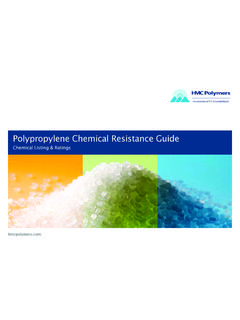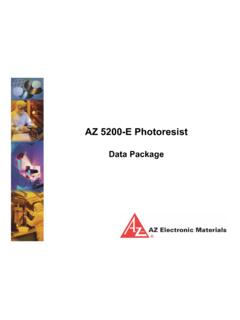Transcription of Polypropylene Chemical Resistance Guide - HMC Polymers
1 Chemical Resistance GuideChemical Listing & Ratings 2/9 Polypropylene Chemical RESISTANCEA bout HMC PolymersHMC Polymers is focused on being Asia s number ONE in PP. We work in close cooperation with our customers to improve existing products and develop new resins for the rapidly changing markets we serve. The company offers a wide range of products suitable for all major applications and processes, as well as innovative new products with expanded capabilities, which are used by customers to replace traditional materials and other have expertise in converting our products with a variety of leading process technologies to ensure our customers are able to obtain Polypropylene grades optimised for their market products produced by HMC Polymers are the essential building blocks used to manufacture countless everyday goods such as consumer products, fresh food packaging, automotive and electrical components, durable textiles, medical applications.
2 Pipe systems and many Chemical resistanceHMC Polymers Polypropylene resins, like most polyole ns, are highly resistant to solvents and chemicals. The results of extensive laboratory and actual eld installation tests of Polypropylene s Chemical Resistance are reported in this downloadable PDF which is periodically updated. The Chemical Resistance data presented in this PDF for a range of over 260 chemicals and substances is based on ASTM D543. TestingUnstressed resin specimens are used measuring 76mm (3 ) long x ( ) thick, in the shape of dumbbells.
3 Results are reported after 1 month immersion. Important: As it is dif cult to create actual service conditions in the laboratory, the results of many of the environments should be taken only as an indication of behaviour in Chemical Resistance capabilityHMC Polypropylene resins have outstanding Resistance to water and other inorganic environments. In most aqueous environments, its weight increase is less than when it has been stored for 6 months at ambient temperatures. When the temperature is increased to 60 C (140 F), the weight increase is less than for a similar period.
4 According to ASTM D570, its 24 hr water absorption rate is It resists most strong mineral acids and bases, but, like the other polyole ns, it is subject to attack by oxidizing more information visit our website: PP resins are appreciably affected by chlorosulfonic acid and oleum at room temperature, 98% sulfuric acid, 30% hydrochloric acid, and 30% hydrogen peroxide at 100 C (212 F). They are also affected by 98% sulfuric acid at 60 C (140 F) and fuming nitric acid and liquid bromine at room temperatures. Under strain, failure could occur with strong oxidizing acids at temperatures lower than those mentioned.
5 With few exceptions however, inorganic chemicals produce little or no effect on HMC PP resins over a period of 6 months at temperatures up to 120 C (248 F).The permeation Resistance of HMC PP resins to organic chemicals depends on the rate and extent to which absorption occurs. This, in turn, affects the suitability of the resin to serve in a particular environment. When the resin is removed from the environment, evaporation will take place and cause it to return almost to its original dimensions. Property changes resulting from the absorption will be reversed if evaporation is and polarity of the organic medium are the foremost factors in determining the extent of absorption by Polypropylene .
6 Absorption becomes greater as temperatures are increased and polarity of the medium is decreased. Polypropylene copolymers swell more than homopolymers, indicating greater absorption. Such nonpolar liquids as benzene, carbon tetrachloride, and petroleum ether have a higher absorption rate with Polypropylene than polar media such as ethanol and reduction in tensile strength and an increase in exibility and elongation-to-break in tension can be expected, depending on the nature and amount of the organic medium PP resins have excellent Resistance to environmental stress-cracking.
7 When they are tested according to ASTM D1693 the brittle fractures that occur with certain polyethylenes in contact with polar organic liquids, detergents, and silicone uids are not observed. Failure of this type with Polypropylene is rare. Those environments known to cause such cracking to Polypropylene are 98% sulfuric acid, concentrated chromic/sulfuric acid mixtures, and concentrated hydrochloric acid/chlorine useful life of HMC PP resins at elevated temperatures is limited by oxidative degradation. The expected life of poly-propylene at any given temperature is also determined by the nature of the environment, and by the extraction of some of the anti-oxidant system.
8 Any environment that tends to extract the antioxidants may lead to more rapid breakdown of the Polypropylene , especially at elevated enquiries: Chemical RESISTANCE3/9 Technical Information By using any Technical Information contained herein, you agree that said technical information is given for convenience only, without any warranty or guarantee of any kind, and is accepted and used at your sole risk. You are encouraged to verify independently any such information to their reasonable satisfaction. As used in this paragraph, Technical Information includes any technical advice, recommendations, testing, or analysis, including, without limitation, information as it may relate to the selection of a product for a speci c use and using an HMC Polymers product, customers and other users should make their own independent determination that the product is suitable for the intended use.
9 They should also ensure that they can use the HMC Polymers product safely and legally. This document does not constitute a warranty, express or implied, including a warranty of merchantability or tness for a particular purpose. In addition, no immunity under HMC Polymers , LyondellBasell s or third parties intellectual property rights shall be implied from this document. No one is authorized to make any warranties, issue any immunities or assume any liabilities on behalf of HMC Polymers except in a writing signed by an authorized HMC Polymers employee.
10 Unless otherwise agreed in writing, the exclusive remedy for all claims is replacement of the product or refund of the purchase price at HMC Polymers option, and in no event shall HMC Polymers be liable for special, consequential, incidental, punitive or exemplary damages. Users should review the applicable Material Safety Data Sheet before handling the listChemicals A - BEnvironmentConc. Temp C%2060100 Acetic acid (glacial)97AB (80 C)- Acetic acid50AA (80 C) -Acetic acid40A--Acetic acid10AA-Acetone100AA-Acetophenone100BB- Acri avine (2% solution in H20) 2AA - (80 C)Acrylic emulsionsAA-Aluminum chlorideAA-Aluminum uorideAA-Aluminum sulfateAA-Alums (all types)AA-Ammonia (aqueous)30A--Ammonia gas (dry)AA-Ammonium uoride20AA-Ammonium hydroxide10AA-Rating systemThis chart rates the Chemical Resistance of HMC PP resin according to the following code.

